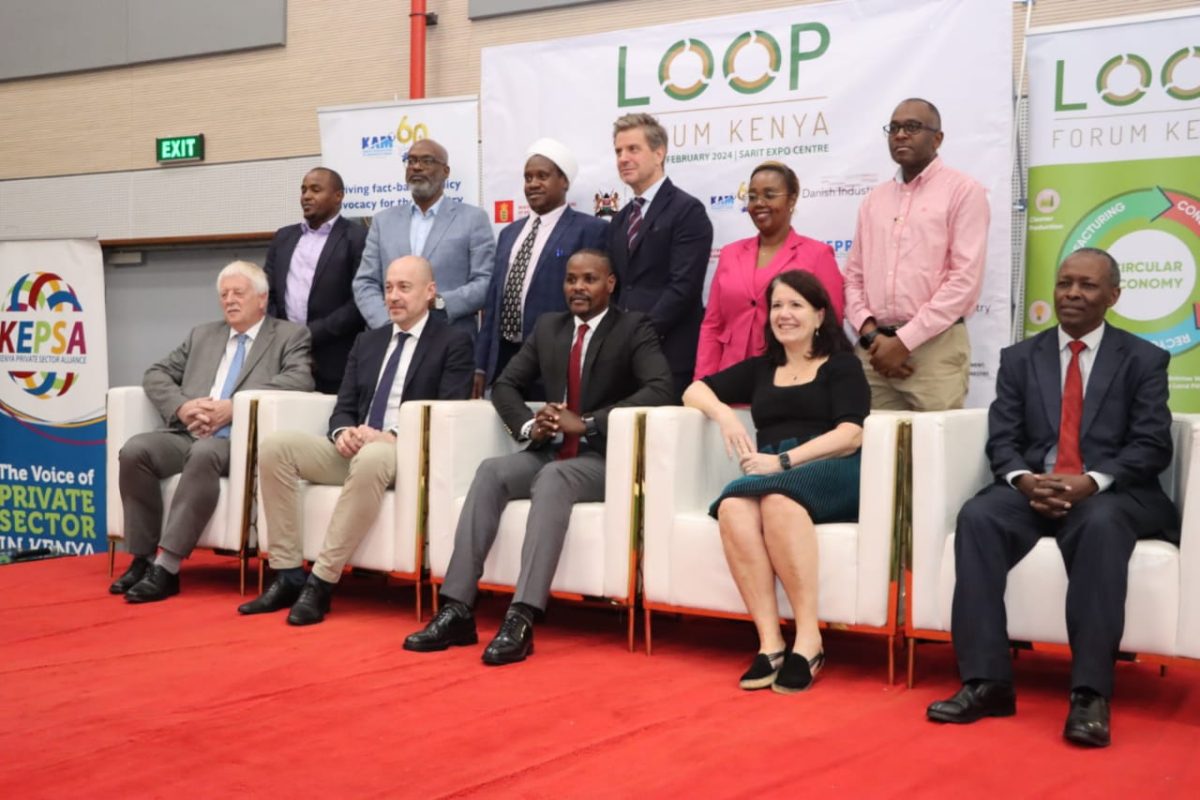28th February 2024 – Nairobi: The Kenyan government has urged manufacturers to transcend the confines of conventional manufacturing and forge a new paradigm that embraces circular design models.
“To spark sustainability, let us reimagine our systems, for in their transformation lies the key to unlocking the boundless potential of a circular economy,” said Eng. Festus Ng’eno, the Principal Secretary of the State Department of Environment and Climate Change.
He was speaking during the 2nd Loop Forum in Nairobi, a cross-sector gathering organized by the Kenya Association of Manufacturers (KAM) in partnership with the Kenya Private Sector Alliance (KEPSA), the Ministry of Environment, Climate Change and Forestry (MoECCF), the Royal Danish Embassy, the National Environment Management Authority (NEMA), the Danish Industry, and the Government of the Netherlands. This year’s forum aimed to accelerate the transition to a circular economy through fostering collaborations, policy dialogue, and innovative circular business solutions.
The PS noted that the Loop Forum Kenya provided a platform to reflect and develop tangible solutions on how private sector businesses can be part of the solutions to the triple planetary crisis of pollution, biodiversity loss, and climate change.

Joyce Njogu, the KAM Head of Consulting and Business Development, further emphasized the forum’s significance in driving tangible progress towards a circular economy. “As we convene to accelerate the transition to a circular economy, we reinforce the industry’s pivotal role in shaping sustainable practices and fostering innovation. It also reflects our nation’s dedication to sustainable development and environmental stewardship as part of the commitments made during the Africa Climate Summit (ACS).” Representing the Kenya Private Sector Alliance, Dr. John Wandaka, the Vice-Chair of the KEPSA Environment, Water, and Natural Resources Sector Board, underscored KEPSA’s pivotal role in driving change and innovation in the circular economy space. He highlighted KEPSA’s initiatives, like the Kenya Private Sector Strategy on Climate Change Solutions, emphasizing their commitment to integrating climate action across business value chains.
He urged attendees to seize the opportunity to forge new alliances, catalyze innovation, and enact policies that will transform the vision of a circular economy into a tangible reality. “Our strength lies in our unity, and it is through collaboration between government, industry, and civil society that we shall usher in an era of sustainable prosperity,” said Dr. Wandaka.
The Danish Minister for Environment, Magnus Heunicke, acknowledged and appreciated the collaboration between Denmark and Kenya, citing the Waste Management Act and the EPR regulations as critical successes due to the collaboration. He then emphasized the transformative power of cross-border partnerships: “Innovation knows no boundaries, and neither should our efforts towards sustainability. Together, hand in hand, we shall continue learning from each other, localize the lessons, and pioneer a new era of circular economy solutions.”
His sentiments were echoed by Vice Minister Afke Van Tijn, from the Ministry of Infrastructure and Water in the Netherlands, who spoke of unity in diversity, emphasizing that “Our shared destiny is intricately woven with threads of collaboration. Let us join forces to confront our challenges head-on, the triple planetary threat, and craft a future where sustainability knows no borders.”
The forum also featured a panel discussion moderated by Ebenezer Amadi, highlighting circular business solutions. Various industry representatives advocated for sustainable practices, emphasizing that impactful change often begins with modest yet significant steps.
Rosalind Rwaru, the Head of Sustainability at Bio Foods, asserted that sustainability is not a distant goal but a journey that begins with small yet deliberate actions. “In the pursuit of sustainability, we often overlook the simple yet impactful changes we can make in our daily operations,” said Rwaru, adding that there is money to be found in running a business sustainably.
Julius Owino (Juliani), a Kenyan Pop-Artist and the founder of Takabank, challenged the notion that waste is merely a problem. “Waste is not a problem; it’s an opportunity waiting to be unlocked. By creating value around waste through effective communication and innovative solutions, we can transform waste into a valuable resource, benefiting both the environment and our bottom line,” asserted Juliani.
Kristjan Hugosson, the Sustainability Technology Manager at Atea – Denmark, highlighted the urgency of addressing electronic waste (e-waste) in today’s digital age. “At Atea, we’re committed to addressing this challenge by innovating sustainable technology solutions,” explained Christian, adding that “By extending the lifecycle of electronic devices, implementing recycling programs, and promoting responsible consumption, we can minimize the environmental impact of e-waste while maximizing its potential for reuse.”
Dr. Michael Kalo of Loopworks Ventures stressed the critical role of small and medium-sized enterprises (SMEs) in economic growth and job creation while acknowledging the unique challenges they often face in accessing financial resources. By developing financial products tailored to their needs and supporting sustainable practices, we can empower SMEs to thrive while advancing our sustainability goals,” he concluded. The Loop Forum took place on the sidelines of the sixth session of the United Nations Environment Assembly (UNEA-6), which is taking place in Nairobi this week, with a focus on multilateralism as a tool to help tackle the triple planetary crisis of climate change, nature and biodiversity loss, and pollution and waste.
